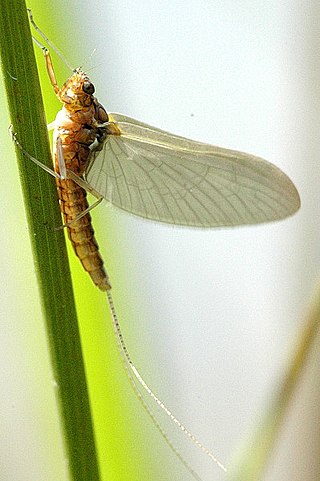Related Research Articles

Mangrove forests, also called mangrove swamps, mangrove thickets or mangals, are productive wetlands that occur in coastal intertidal zones. Mangrove forests grow mainly at tropical and subtropical latitudes because mangroves cannot withstand freezing temperatures. There are about 80 different species of mangroves, all of which grow in areas with low-oxygen soil, where slow-moving waters allow fine sediments to accumulate.

Caenis is a genus of mayflies. They are very small in size, sometimes with a body of only an 1/8 of an inch (3.2 mm).
Streptomyces mangrovi is a bacterium species from the genus of Streptomyces which has been isolated from mangrove soil from the Dongzhaigang National Nature Reserve from the Haikou City, in China.
Streptomyces qinglanensis is a bacterium species from the genus of Streptomyces which has been isolated from mangrove soil from Wenchang in the Hainan in China.
Aurantiacibacter luteus is a Gram-negative and aerobic bacteria from the genus Aurantiacibacter which has been isolated from mangrove sediment from the Yunxiao mangrove National Nature Reserve in the Fujian Province in China.
Muricauda zhangzhouensis is a Gram-negative, rod-shaped and non-motile bacterium from the genus of Muricauda which has been isolated from mangrove sediments from the Fugong Mangrove Nature Reservation Area in the Fujian province in China.
Tsuneonella flava is a Gram-negative, aerobic, rod-shaped and non-motile bacterium from the genus Tsuneonella which has been isolated from isolated from mangrove sediments from the Jiulong River in China.
Tsuneonella mangrovi is a Gram-negative, rod-shaped and facultative anaerobic bacterium from the genus Tsuneonella which has been isolated from mangrove sediments from Zhangzhou in China.
Streptomyces caeni is a bacterium species from the genus of Streptomyces which has been isolated from mangrove mud from Sanya in China.
Mangrovimonas xylaniphaga is a bacterium from the genus of Mangrovimonas which has been isolated from mangrove sediments from the Matang Mangrove Forest in Perak.
Mangrovimonas yunxiaonensis is a Gram-negative and short-rod-shaped bacterium from the genus of Mangrovimonas which has been isolated from mangrove sediments from the Yunxiao mangrove National Nature Reserve in China.
Alkalihalobacillus is a genus of gram-positive or gram-variable rod-shaped bacteria in the family Bacillaceae from the order Bacillales. The type species of this genus is Alkalihalobacillus alcalophilus.
Alkalihalobacillus algicola is a Gram-positive, spore-forming, aerobic and motile bacterium from the genus of Alkalihalobacillus which has been isolated from the alga Fucus evanescens.
Alkalihalobacillus alkalilacus is a Gram-positive, endospore-forming, aerobic, rod-shaped and motile bacterium from the genus of Alkalihalobacillus which has been isolated from sediments from the Sambhar Lake in Jaipur.
Alkalihalobacillus alkalisediminis is a Gram-positive, alkaliphilic and non-motile bacterium from the genus of Alkalihalobacillus.
Alkalihalobacillus bogoriensis is a Gram-positive, strictly aerobic, spore-forming, alkaliphilic and non-motil bacterium from the genus of Alkalihalobacillus which has been isolated from Lake Bogoria.
Alkalihalobacillus ligniniphilus is a Gram-positive, alkaliphilic and halotolerant bacterium from the genus of Alkalihalobacillus which has been isolated from sediments from the South China Sea.
Alkalihalobacillus lonarensis is a Gram-positive, alkalitolerant, endospore-forming, rod-shaped and motile bacterium from the genus of Alkalihalobacillus which has been isolated from the Lonar Lake.
Alkalihalobacillus marmarensis is a Gram-positive, aerobic and obligately alkaliphilic bacterium from the genus of Alkalihalobacillus which has been isolated from isolated from mushroom compost from Yalova.
Alkalihalobacillus nanhaiisediminis is a Gram-positive and rod-shaped bacterium from the genus of Alkalihalobacillus which has been isolated from sediments from the South China Sea.
References
- 1 2 "Species: Alkalihalobacillus caeni". LPSN.DSMZ.de.
- 1 2 Mo, Kunlian; Huang, Huiqin; Bao, Shixiang; Hu, Yonghua (1 March 2020). "Bacillus caeni sp. nov., isolated from mangrove sediment". International Journal of Systematic and Evolutionary Microbiology. 70 (3): 1503–1507. doi: 10.1099/ijsem.0.003853 . PMID 32100673. S2CID 211522656.
- 1 2 "Alkalihalobacillus caeni". www.uniprot.org.